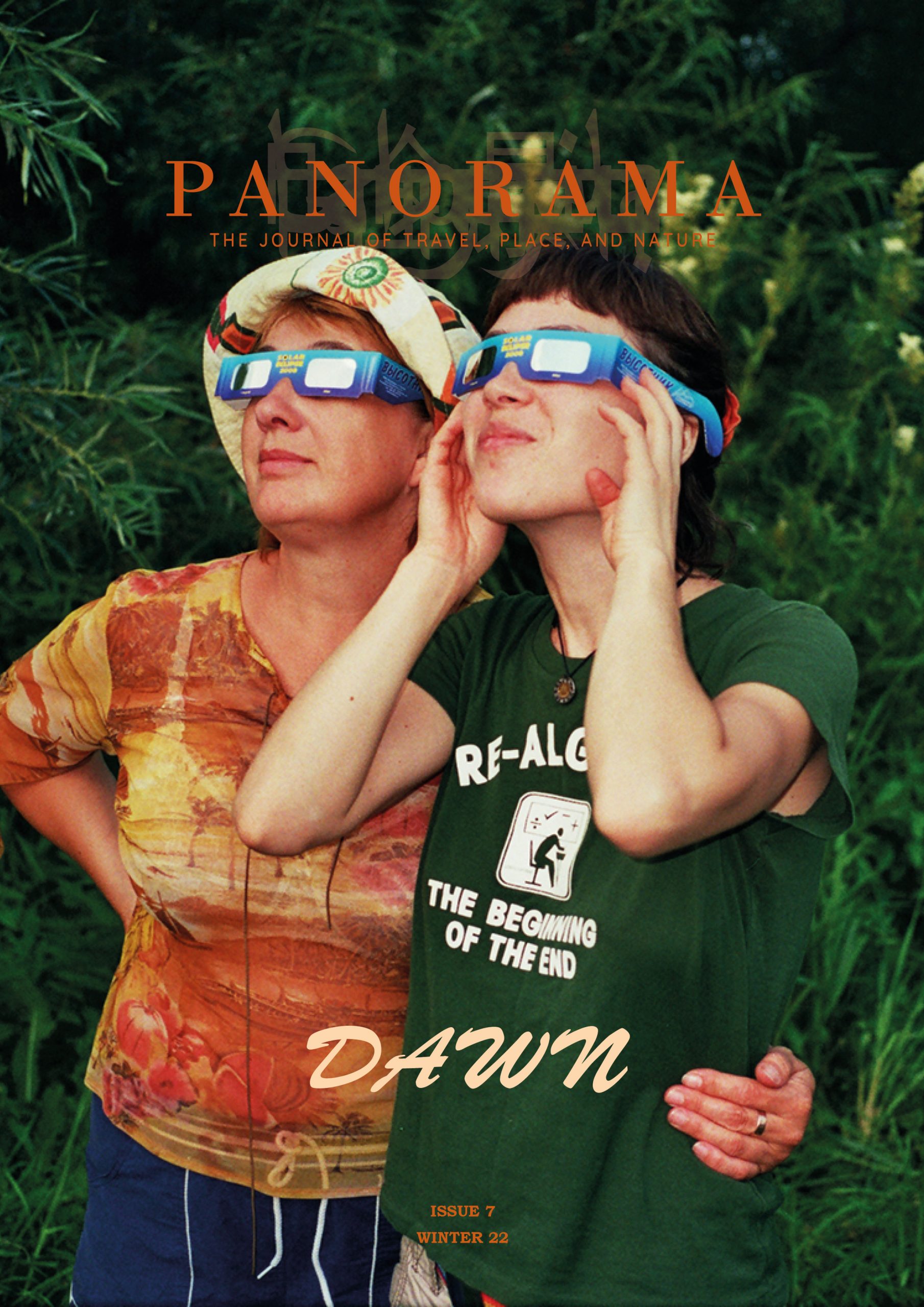Back in Marseille, it’s still possible to swim in the late reaches of October. The water, not being oceanic, stays warm, and like the temperature during a clear day, is most invitingly turgid at four in the afternoon. The Mediterranean, being a land surrounded sea, warms up in strata in the spring. In March, the surface to about six inches deep contains the sun rays and is at least ten to fifteen degrees warmer than what lies below. By April, you can easily wade in—from your feet to your kneecaps it is freezing—but from the knees up it’s a veritable soup.
When the water is warm enough to swim, surprisingly few beach-goers jump in. Even in the desperately hot summer months most people prefer to roast on the stony lip of this gigantic salty swimming pool. Those who do enter the water are of the extremes of age: the elderly and little children. Gorgeous young women bake away their youth into deep shades of bronze and brown on the shore. Men lie on the beach like pretzels requiring the compliment of mustard. Many choose to merely shower the heat away rather than submerging themselves in the cool belt of turquoise, then farther out, deep band of resplendent blue.
Probably, their biggest hang up is the vast amount of spiky sea urchins peopling the rocks below the surface. There isn’t any threat of sharks and very little pollution and trash at the better beaches. There isn’t any imaginable reason to stay out of the Mediterranean liquid jewel. Perhaps, to the veterans of fun, it’s old news.
From an American perspective, it’s a most inviting swimming pool, replete with dryads, whose banks would be burgeoning with people drinking beer and cooking hamburgers on Hibachis. The Mediterranean is a source of sacrament, revitalization, relaxation, and pure joy that the French completely take for granted.
The cantonnier’s presence is known by his calling cards: rags bundled in the streets. His job is to open the underground plumbing of the city (fire hydrants don’t exist) so that the resulting surge of water, with his rags used as breakers, creates a stream of cleansing force that rivulets the gutters, sidewalks, streets, and curbs.
To control the flow in a primitive yet artistic swash of hydrology, his tool of choice is bundled rags tied into knots, thrown to the ground, that absorb and redirect the spring-like water’s path.
The effect is one akin to a governed flood—a simultaneous eruption of mountain springs within a section of city streets. Interesting flows and drainage patterns are created by his rag placements. Since the work is serious business children don’t dare play, float sticks or leaves, in the mini-canyons of tiny grandeur. The day’s garbage and stains are washed away in the controlled flushing. The sound of trickling water cools the ears with a meditative burbling. It is a most sacred way to maintain cleanliness in the city, these effervescent Zen fountains of the quotidian.
The homeless aren’t so homeless in France in the disconnected-from- everything reality the concept connotes in the U.S. Generally speaking, they seem to have more of a chance of finding a place to stay, or existing un-alone, in Europe. Sometimes there are friends, or friends of friends, or friends of friends of family, or there are hostels, houses of prostitution, and in the forgotten margins of the city abandoned buildings or hedges in parks that conceal living places between stone walls, or large wooded fields awaiting commercialization bordered by chain link fences with inviting gaping holes. The police leave them be.
The temporarily destitute dress pretty well considering their lot in life: jeans, decent long-sleeved shirts, and they shower and shave at least once every few days. In a crowd, they are imperceptible. They announce their caste when they appear alone.
What they do, rather than panhandle, is to stand at the door of a post office (in France, La Poste is also the bank for many) and they open the door for customers. In their hands they hold a small saucer in which the generous may place a few coins. They do not ask for money. They simply greet you with a “Bonjour”. They attempt to incorporate themselves into the greater society that has somehow rejected them by providing a favor for one in return. Spare change.
Many today hail from Eastern Europe, in search of the French version of the American dream (it comes with more beautiful women and better food). Socialism gives them the benefit of rudimentary free health care. The men or women, and it is mostly the men you see, will stray into an affluent neighborhood and will find an intersection of pedestrian traffic, meaning: near a bakery or small grocery store, and he will become a recognizable fixture. He will stand holding his empty plate. He will speak about the weather, make any amount of small talk to passersby, he won’t talk of himself or his life, and he will never overtly demand money. This is how they “beg”.
There’s no confrontation involved. They await the blessing of charity.
One particular man would sit on the doorstep of my flat. He would always open the door for me, help transport groceries up the winding, turning array of steps, or assist me in any task he could assume a role in completing. He was from Hungary and would return there during apple harvest, for work. He apparently was a hopeless drunk but he was attempting best he could to survive with some sense of dignity.
It was a sad reality to encounter his presence daily. I would give him money at first. Then it was cigarettes. Then bags of bread and cheese. Once he told me that he had relatives in the States and even produced a document denying him a passport as proof of his story. He couldn’t speak anything but Hungarian. My expertise in that language was, and still is, lacking.
One day he up and disappeared.
In France, to be homeless is unfortunate but the situation doesn’t appear to be as widespread and socially caustic as it is in the U.S. The homeless seem to be few and far between– those who are suffering become regulars that are known to the denizens of a given area. It is perhaps because life on the whole is more condensed and a citizen has a greater opportunity of seeing the same people more often. In short, the homeless are not victims of pure anonymity—they are known faces and thus are linked closer to their surroundings. They become familiars. If one chooses, some type of tenuous relationship can be established, their stories can be known. In the U.S., the homeless comprise an uninteresting factoid as seen on TV and as we cross the bad parts of town in our moveable coffins.
Proximity equals empathy. The French tolerate the homeless in a rational way: they provide them with a little dignity and they don’t try to feel-good them into changing their chosen lifestyles. That is why the problem there exists, but is not an epidemic.
Like anywhere, sadly, the escape from the reality of reality is the television, which is taxed. That would be the cause of revolution in the States. The shows that are most popular are ones that blatantly peddle nostalgia, romance, and evil seductive combinations of the two. They appear during prime time and last until one a.m. They feature all but forgotten stars of television, film, the stage, whose expertise has dwindled into knowing the answers to the most inane questions adults have ever asked adults. They talk about themselves with too little candor and much too much superfluous personal insight. They talk of their own personal concepts of life, love, eroticism without indulging in the gory details, yet hinting at them. For very lonely viewers, they provide a regular cast of recognizable friends.
At anytime during these broadcasts, the participants might break into song. Reasons unknown. They will be tunes only the oldest members of the audience can remember. Unfortunately they are remembered by heart, which causes the viewer him or herself to uncontrollably sing along. The subject matter: love, love lost, love regained, love lost again. Songs that evoke a better place and time. Songs that are free of any sexual innuendo referring more to a historical event, or generally antiquated thoughts and emotions.
There is also the genre of romantic-voyeuristic programs in which contestants publicly confide more than you’ve ever wanted to know. Not details of their lovemaking technique, but worse– how they go about enacting their one-man or one-woman theatrical presentations of romance/desire.
One of these shows features three pairs of contestants. Each couple represents two people deeply in love with one another. What the game devises to be unfolds in a series of vignettes and scenarios designed to measure how far, or how much humiliation they can endure, by publicly proving their love. The aim of the competition is for the audience to choose the couple “most in love”. It is utterly ridiculous.
Scenes include embarrassing flower deliveries to the female by the man dressed as a giant bunny rabbit (you choose the goofy costume here) at her place of employment. Some episodes measure the reaction of one of the two as they happen upon a billboard, or even sky writing, with a message of the other’s love (imagine the surprise!). Often these scenarios are constructed to make one lover look like the biggest fool there ever was while his beloved looks on enthralled. The meaning of this show still eludes.
On the surface: a re-enactment of the mating ritual? Or is it proof that men are proud creatures of romance, i.e., that they are in touch with their feminine selves; that they can dominate culture, art, industry, and fantasy as well? That there is the need to place women on pedestals and give them the gaze of an overlord, for in the show, the female is the ultimate critic.
The apex, zenith, or rock bottom of the program comes with a skin curdling oh-how-we-wish-it-were-karaoke singy song section. The man gets a chance to serenade his beloved on national television. In this gut-wrenching part of the telecast, tears are inevitably shed by all participants: him for her, her for him, both of them in tandem because they can’t believe they’re doing this in front of millions of viewers, and you, yes, you, the anonymous looker on. Tears of pure cathartic embarrassment. Tears of remembrance of a lost love. Tears envisioning the two after the show in a passionate embrace that their non-stardom has inspired. Tears caused by the wholesale showmanship that true feeling can be boiled down into ratings and marketed. Tears of clowns.










